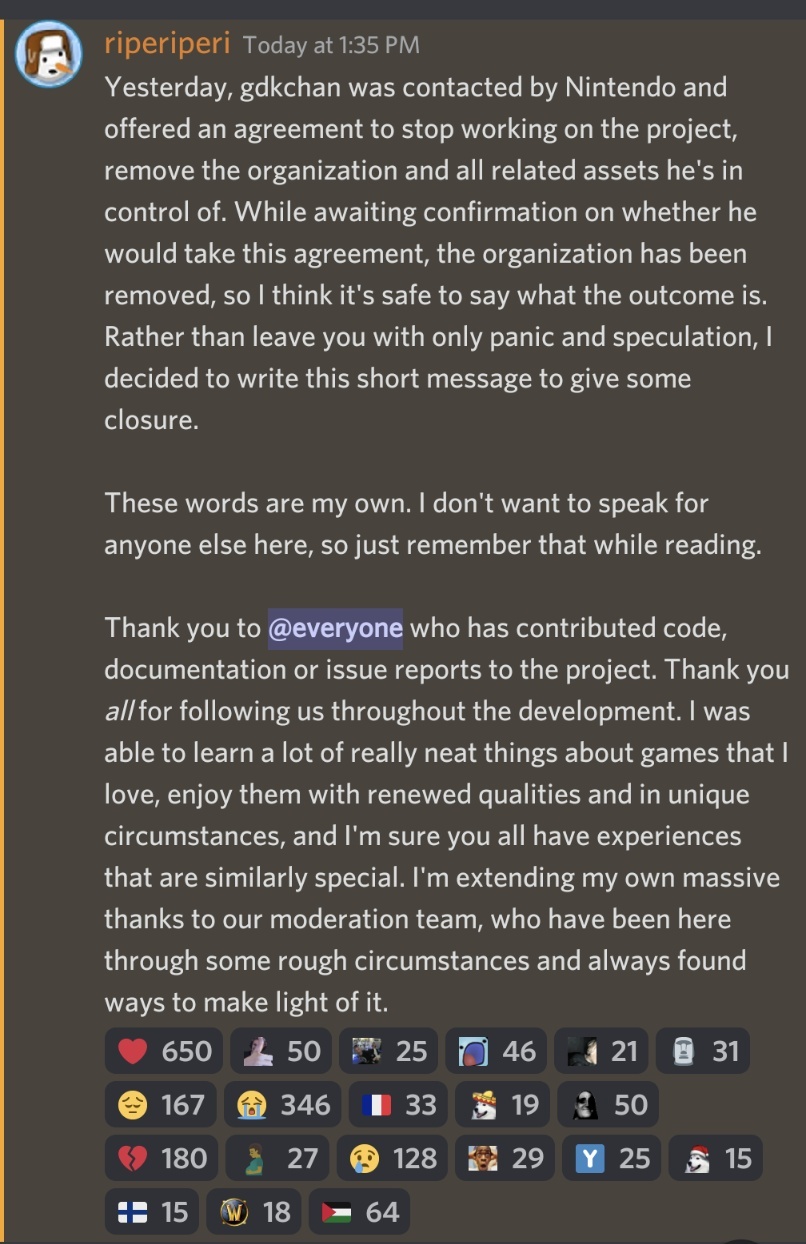

They’ve been on some kind of emulation crusade then, because it looks like they just killed Ryujinx:



They’ve been on some kind of emulation crusade then, because it looks like they just killed Ryujinx:



They just sent out a mass email to users yesterday informing us of this, I got it too. I wonder if it wasn’t getting enough attention, or if they wrote this back in June but only just made the article visible.


I use Backblaze B2, but stored in an encrypted Restic container, set up using this guide:
Restic has been great for automating backups, and even letting me mount the encrypted storage to grab individual files. I like doing it this way since I don’t have to trust Backblaze isn’t reading my data - I know for sure that they can’t.
Performance of storage that is both remote and encrypted is about what you would expect, but I don’t need access to the data unless something bad happens.


Ok… sure. But what physical devices would I use, and what software would they run?


Are there any “open” solutions to mesh networking that can compare to TP-Link Omada? I don’t think any open source hardware or software can come close, especially not for the newer Wi-Fi standards.
I haven’t bought them yet, but I’m seriously thinking about some Omadas. I imagine I can prevent them from phoning home, and the management software can run locally in a Docker container. Running it like that would be good enough for me even though they’re not “open.”
I’m planning a rework of my home Wi-Fi, and my current plan is an OPNsense box from Protectli, and a few EAP772’s:
https://www.tp-link.com/us/business-networking/omada-wifi-ceiling-mount/eap772/
If there’s something comparable/better that’s more of an open ecosystem, you definitely have my attention while I’m shopping around for different options.


Definitely recommend Motrix:
If the Google download link supports it, it should be fairly resistant to interruptions. If it doesn’t, this might not help much, but you should still use this instead of just a browser.
I haven’t tried to download a Google takeout, so you might need to get clever with how you add the download link to it.
If you just can’t get it to work, you can try getting the browser extension to automatically send all downloads to Motrix. There is some setup required, though:
https://github.com/gautamkrishnar/motrix-webextension
Good luck!


Everyone sees this notice, I saw it on the official desktop Firefox client. They’re just trying to reach as many people as possible.


What do you mean? RPCS3 is an excellent emulator. It’s not completely hardware accurate, almost no 3D emulator is, but it’s still pretty good.


Be aware, it’s not free as in costs $0, it’s free as a “Giveaway,” where you must accept these terms:
By clicking the ‘Add to library’ button, I agree to receive marketing communications from GOG and CD PROJEKT on my email address and through GOG services and GOG’s Trusted Partners’ services, to get Shadows: Awakening. See our Privacy policy.


Before it got enshittified with an update a few years ago, I used the RealVNC Android app to connect to a few of my own VNC servers. Wasn’t interested in any of the fancy features, I just wanted a good VNC app.
Now I use AVNC. It’s solid, performs better than RealVNC used to, and it’s open source! You can get it on FDroid.


It should still work!
I only go back and make changes to LED if something breaks with a major Lemmy update, but Lemmy hasn’t had a major update since January. Lemmy v0.19.4 isn’t released yet, but when it is, I’ll make sure the deployment is up to date.
Note that it does not have any advanced features that a major instance might want, such as storing images on S3, exporting data, or image moderation. If you intend for your instance to grow for 100+ users, this isn’t for you. This is only intended for beginners who are overwhelmed by the other Lemmy hosting options, and want an easy way to host a small single-user or small-user instance.


This was the first thing that came up in a search. Looks like there’s a few sizes too:
https://meowspace.biz/product/meowspace-microchip-system/
It looks pretty pricey, but considering microchip pet doors on their own cost about that much, this seems like a cheaper option than DIYing some contraption involving a microchip pet door.
Look around for this kind of stuff OP! It exists!
You also can’t open two spreadsheets that have the same filename. I’m sure that’s led to a helpdesk call or two.
Cloudflare Tunnels are black magic and exactly what you’re looking for:
https://developers.cloudflare.com/cloudflare-one/connections/connect-networks/
Free, no need to self host a server somewhere externally. Can even be used for SSH!


I’m scratching my head to think what Vultr could do better in this case
There was substantial room for improvement in the way they spoke publicly about this issue. See my comment above.


I still don’t like how flippant they’ve been in every public communication. I read the ToS. It’s short for a ToS, everyone should read it. They claim it was taken “out of context,” but there wasn’t much context to take it out of. The ToS didn’t make this distinction they’re claiming, there was no separation of Vultr forum data from cloud service data. It was just a bad, poorly written ToS, plain and simple.
They haven’t taken an ounce of responsibility for that, and have instead placed the blame on “a Reddit post” (when this was being discussed in way more detail on other tech forums, Vultr even chimed in on LowEndTalk).
As for this:
Section 12.1(a) of our ToS, which was added in 2021, ends with “for purposes of providing the Services to you.” This is intended to make it clear that any rights referenced are solely for the purposes of providing the Services to you.
This means nothing. A simple “we are enhancing your user experience by mining your data and giving you a better quality service” would have covered them on this.
We only got an explanation behind the ToS ransom dialog after their CMO whined in a CRN article. That information should have been right in the dialog on the website.
In both places, they’ve actively done vague things to cause confusion, and are offended when people interpret it incorrectly.


They also don’t magically make lawyers free. No lawyer is going to bother with an EULA squabble pro bono.


I’m not talking about that. I’m talking about this:
I agree with the sentiment here, but all the technologies mentioned allowed us to ship a working application in a timely manner. I think that should always be the first goal. Now that this is out of the way, we can start looking at improving efficiency, security, resilience etc.
“Security Second” is not good messaging for a project like this.
But I’m glad my comment was hilarious to you.


I don’t need or want replication of my private projects to a peer to peer network. That’s just extra bandwidth to and from my server, and bandwidth can be expensive. I already replicate my code to two different places I control, and that’s enough for me.
I’m not sure who Radicle is for, but I don’t think the casual hobbyist looking to self host something like Forgejo would benefit at all from Radicle.
Loading the source code for Radicle on Radicle also seems fairly slow. It seems this distributed nature comes at a speed tradeoff.
With the whole Yuzu thing going on, I can see some benefit to Radicle for high profile projects that may be subject to a takedown. In that respect, it’s a bit like “Tor for Git.”
I suspect that over time, pirate projects and other blatantly illegal activities will make use of Radicle for anti-takedown reasons. But to me, these two projects solve two different problems, for two different audiences, and are not really comparable.
Edit: There is already enough controversy surrounding Radicle, that, if I were someone looking to host a takedown-resistant, anonymous code repository, I would probably be better served hosting an anonymous Forgejo instance on a set of anonymous Njalla domains and VPSes. The blockchain aspect was already a bit odd, and what I’m now seeing from Radicle does not exactly inspire confidence. I don’t think I’ll ever use this.
Not really. 8BitDo really blew it with the Ultimate. They confusingly have two different “versions” of it, and neither have the full range of device compatibility that previous 8BitDo controllers had. The most egregious exclusion from the Ultimate was Xinput over Bluetooth. I still have no idea why they decided to drop that.
If this new controller has Xinput over Bluetooth, all of the compatibility from above, and a strong battery life, it might be a day 1 buy. It will have hall effect sticks, so this sounds like everything I wanted the 8BD Ultimate to be. I hope there aren’t any showstoppers once reviews start coming out.